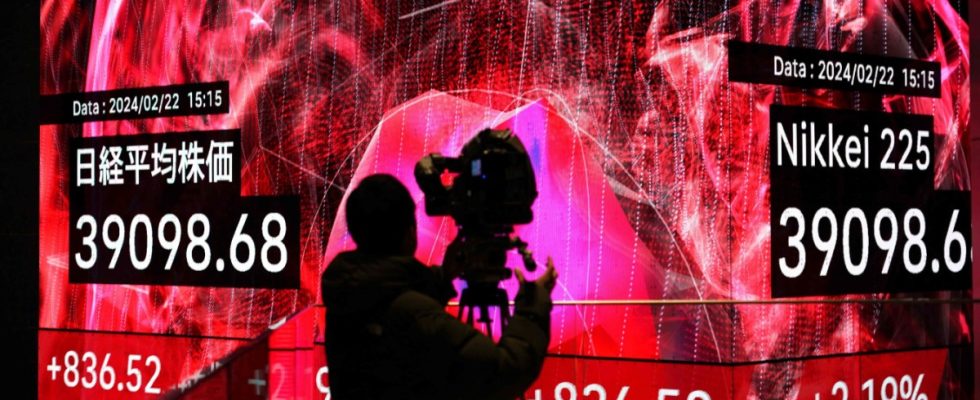Perhaps Yoshika Tagashira best shows how forgotten the Japanese stock market has long been. When the data engineer moves into her workplace in the middle of the former trading hall, she sits alone in the neon-pale heart chamber of the stock exchange. Clinical white spotlights cast their light from above, and the 16 flashing blue course screens are reflected on the meter-high glass walls. “The Tokyo Stock Exchange plays a special role,” Tagashira said in a recent television documentary, “because it is the first to open every day.” One could say: Ms. Tagashira sets the tone for the global stock markets.
This has probably never been truer than it was this week: after 34 years, the Japanese leading index Nikkei 225 reached its old record level for the first time on Thursday. Right at the start of trading, the German leading index Dax also rose to a new high, before the US leading index S&P 500 also set a record in the afternoon at 3:30 p.m. local time. The land of the rising sun gave the global stock markets the impetus, and the records followed until sunset.
Even though these stock exchanges are thousands of kilometers apart, they have become surprisingly close to one another in another way: regardless of whether Japan has been suffering from its anemic economy for years, Germany recently slipped into recession and the Americans surprised with comparatively good economic data – stock experts This week’s price frenzy was concentrated primarily on a single topic: “All the attention is focused on it like a spotlight,” says fund manager Manfred Schlumberger from the Ha-Va management company. The magic word? Artificial intelligence.
Stock market strategist Scott Rubner from the investment bank Goldman Sachs only needed six words to put the euphoria into words. The share of chipmaker Nvidia is currently “the most important share in the world,” Rubner wrote in a paper to his customers. After the company presented its quarterly figures on Wednesday evening, the company’s market value increased by $277 billion on Thursday. The financial service Bloomberg has calculated that a company has never gained so much in a single day.
The AI hype is also fueling prices in Germany
The chip company’s sales more than tripled compared to the same quarter last year, its profits even increased ninefold and exceeded even the wildest expectations of analysts. There is particularly great demand for Nvidia’s special chips for artificial intelligence. “Now the company is pulling the entire world stock exchanges with it,” says market expert Schlumberger.
In Japan, too, stocks related to artificial intelligence drove the leading Nikkei index up particularly strongly: the chip manufacturer Tokyo Electron pushed the Japanese stock market just as strongly as the semiconductor suppliers Advantest, Disco and Screen Holdings. “If the world moves away from Chinese or Taiwanese chips, Japan can benefit,” says Japan expert Bernd Weidensteiner from Commerzbank.
The AI effect is also raising prices in Germany: Since last year, the sometimes cumbersome Walldorf-based software company SAP has been speeding up in the field of artificial intelligence and wants to use it to support programmers, for example. And the industrial giant Siemens is working on an industrial copilot; after all, every third industrial machine has a control element from the company. With more than ten percent weight each, the two beneficiaries in the slipstream of the AI hype influence the leading German index more than any other stock. If the maximum weight of the largest stocks in the DAX is allowed to rise from ten to up to 15 percent from this spring, they could soon drive the leading index even more strongly than before.
As the indices continue to climb higher, some are becoming anxious
In fact, the major stock market indices often owe their gains in recent weeks to just a handful of stocks. In Germany, some investors talk about the “Magnificent Five” SAP, Siemens, Telekom, Munich Re and Allianz, which pushed the index up particularly strongly. In the USA there is now talk of the “Super Six” around stocks such as Nvidia, Facebook parent Meta, Microsoft and Alphabet, which account for almost all of the stock market profits of the leading index S&P 500. In Japan, the investment bank JP Morgan recently recommended the “seven samurai” to its customers: In addition to the large corporations Toyota and Subaru, this list includes numerous chip suppliers.
The fact that the most important stocks on the stock exchange have become increasingly important for months has consequences for the entire market. In leading indices such as the Dax or the S&P 500, not every share is represented with the same weight; instead, stock exchanges rank their companies primarily according to market value – i.e. how much all of a company’s de facto tradable shares are worth combined.
If investors with ETFs buy the entire index one-to-one, more money automatically flows into the heavyweight stocks. “It’s a brutal pull into the biggest titles,” says Schlumberger. While the major stock market indices are racing up around the world, some people are becoming anxious. “I see the market as fundamentally broken,” US hedge fund manager David Einhorn said recently because of this size effect. Some even see this as the end of capitalism, especially on the stock markets.

